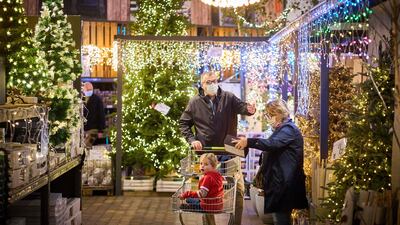People should not hug their grandchildren under the Christmas tree this year because of the risk of spreading coronavirus, Dutch Prime Minister Mark Rutte said.
Announcing an extension of restrictions in the Netherlands, Mr Rutte acknowledged it was “not the glad tidings you hope for at Christmas time”.
But he said children should keep their distance from elderly relatives as much as possible because of the risk of them passing on the virus.
The school holidays will begin a week early to slow the spread among children, while older people are urged to limit their social contacts.
“We know that the coronavirus circulates quite a bit among children who have not been vaccinated and although they usually don't get very sick from it themselves, they can indeed transmit it,” Mr Rutte said.
He called on people to “limit direct contact between over-70s and children as much as possible, no matter how difficult it can be to keep that one and a half metres away, and not to hug the grandchildren under the Christmas tree”.
It came as European Commission chief Ursula von der Leyen said on Wednesday that Christmas would again be “overshadowed by the pandemic”.
She said the Omicron variant was likely to be the dominant strain in the EU by mid-January.
As governments braced for a difficult holiday season, Greece, Italy, Spain and Hungary began vaccinating children aged 5 to 11 against the virus.
Mr Rutte spoke a day before he secured a fourth term in office by agreeing a four-way coalition deal, nine months after an election in March.
By January, when the new government is expected to be sworn in, it is hoped that every adult will have been invited to receive a booster vaccine.
The measures in place until January 14 include the 5pm closure of shops, restaurants, cinemas, theatres and gyms.
Football matches are again being played behind closed doors, while amateur sports are subject to the 5pm curfew.
Mr Rutte said infection rates had showed signs of peaking, but said the Omicron variant was spreading faster than the previously dominant Delta.

Health Minister Hugo de Jonge gave the UK as an example of a country where Omicron appeared to be spreading rapidly.
A new wave of cases is predicted in the Netherlands and “we have to brace ourselves for that”, Mr de Jonge said.
“We don't know exactly how high and when, nor how much health care will be burdened by it, but a new wave is to be expected.”
Britain is similarly banking on booster vaccines to prevent a return to the toughest restrictions over Christmas.
Booster appointments were opened up to all adults on Wednesday after studies suggested a third dose cuts symptoms by about 70 per cent to 75 per cent.
Ministers have been told that the number of virus cases may be about 200,000 per day, far higher than official figures, with Omicron infections potentially doubling every two to three days.
In Germany, Chancellor Olaf Scholz set a target of 30 million people to get a vaccine dose – first, second or third – in the month of December.
“We have no time to lose,” he told parliament on Wednesday. “Help us all to prevent unnecessary suffering. Get vaccinated, protect your life and the lives of others.”


